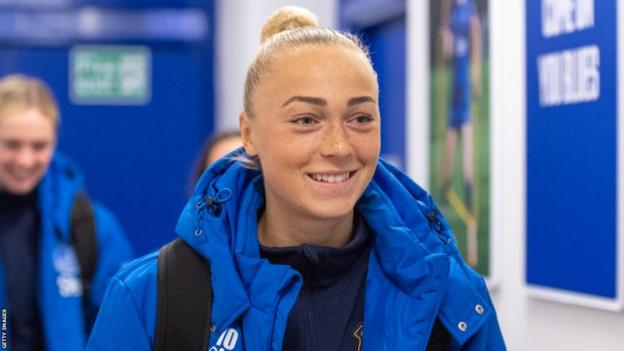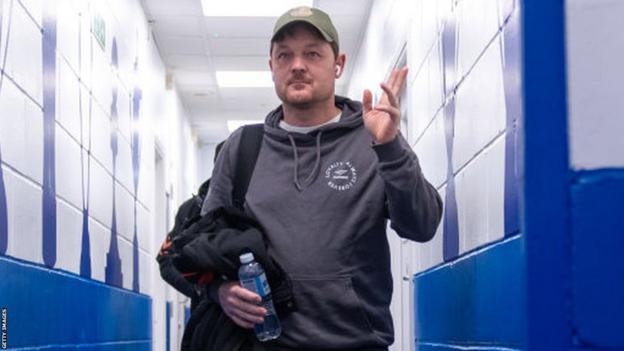Everton: Why WSL club are ‘almost like home’ for large Scandinavian contingent


The English term “scouse” comes from the Swedish word lobscouse, a type of stew.
Liverpudlian locals who ate the stew became known as “scousers”, which was even a surprise to many of the Scandinavian players at Women’s Super League side Everton.
“Does it?!” says Danish forward Rikke Madsen when informed by BBC Sport of this trivia. “Well, it’s almost like home.”
Local etymology aside, the Scandinavian influence on Everton has grown hugely in recent years. The WSL side currently have eight senior players from Norway, Sweden and Denmark, far more than any other side in the league – plus a Danish coach in Brian Sorensen.
While Scandinavia has a huge influence on the history of women’s football – Norway were World Cup winners in 1995 – in the modern era, the region’s influence has been superseded by the United States and other European powers.
But at Everton, the Nordic influence is heavily felt, particularly since Sorensen’s arrival as manager in April 2022. According to Elise Stenevik, their Norwegian defender, this fits because of similarities between the WSL and Scandinavian football.
“There is a different culture in England and Scandinavia, in Scandinavia it is more like a collective culture whereas in England it is more individualistic,” Stenevik tells BBC Sport. “Players coming in from Scandi, they prioritise the team first.
“I’ve played in Norway and Sweden: in Norway it’s very physical, the technique and speed is not as good. In Sweden there is technique and speed. If you combine that, you get the WSL.
“I felt more at home here the second I came, than when I moved from Norway to Sweden.”
Swedish midfielder Hanna Bennison adds: “In our team it is also easier because we have a Scandi coach. So we are more used to how he wants to play. Every coach has different style, but it is similar to what we are used to.”
‘I felt I knew you because you were Danish’

That shared heritage – across language and culture, as well as football – is even more significant in allowing players to settle off the pitch.
It is something Madsen knows particularly, having only arrived in January on loan from American club North Carolina Courage.
“It has been really easy, and it’s because there are so many Scandinavian girls here,” she says of settling into a new team and city after arriving midway through a season.
“Obviously I didn’t know them [before], but you feel like you have some kind of connection. I can actually speak Danish to them, and they can sort of understand what I am saying.
“It has been a very safe environment to come into. That just makes everything easier when you need to settle in fast in the middle of the season.
“It’s been really nice, but also all the other girls have been really welcoming, not just the Scandis.
“Right now I am still staying in a hotel in Liverpool, so it doesn’t really feel like I am completely settled yet. But I live close to two of the other Danish girls here, so we have been going out for… well I don’t drink coffee but they do, so I have been looking at them drinking coffee.
“It’s just nice. Like the first night I was at the hotel, Sara [Holmgaard, her team-mate] was texting me saying ‘this is where we are’, and it was like three minutes away, and I just felt, ‘OK, now I can relax’, because I know they are close.”
Stenevik adds: “When you came in I felt like I knew you because you are Danish. You have a culture similar to my one at home in Norway.”
‘What are they talking about?’

Creating a welcoming environment for the Scandi influx started with Bennison, who was signed by Everton in 2021, the same summer as two other Swedish players, Anna Anvegard and Nathalie Bjorn.
“I arrived with two Swedish girls, which was very nice for me, but it was difficult to get into the rest of the team because there were a lot of people from a lot of countries and not so many Scandis,” says Bennison.
“Everyone has always been nice, but now it really feels like we have a nice team feeling.
“I helped one Danish player [Karen Holmgaard], who lived with me when she first joined. Otherwise I just try to talk to them. I’m not that much of a forward person, I’m quite shy…”
“You were really good with Karen,” chimes in Stenevik. “You’ve been really kind.”
While this community has helped players settle at Everton, Stenevik and the others acknowledge that they should not become a clique away from the rest of the squad – especially when it comes to language.
“If we sit down for lunch we speak English, no matter how many Scandis are at the table,” says Bennison. “But if we are just us together we speak Danish or Swedish.”
“That’s something we need to work on as Scandis,” adds Stenevik. “Like if I’m sitting and Benni is next to me, I might say something in Swedish because it feels more natural, but every person sitting around is thinking ‘what are they talking about’.”
The whole Everton squad will need to pull together to get them away from the WSL relegation zone – Everton sit 10th after 13 games, five points above bottom club Bristol City.
But that will not quash the Scandi pride, particularly that new-found knowledge of their influence on local culture.
“The scouse are always so proud of that word,” Stenevik says of the lobscouse revelation. “Now we can say it is actually Scandinavian.”
Source link



